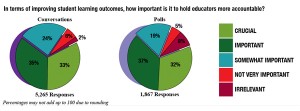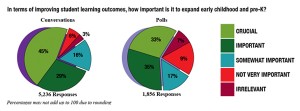Message sent: Fix schools, send us the bill

Michigan residents want better schools -- and they think the state will have to spend more to get them.
That’s among the findings of the largest effort ever to collect and analyze public opinion on K-12 education in Michigan.
More than 7,500 people voiced their views on the state’s public education system, over the course of 12 months in more than 250 community meetings from Monroe to Marquette and in two scientific polls.
Gathering the opinions of that many people on one issue is a “prodigious survey,” remarked Charles Ballard, a Michigan State University economics professor. Ballard’s State of the State survey polls 1,000 people, “and that’s big,” Ballard said. “A lot of polls have a sample size of 600. Your survey will be an accurate representation of public opinion on these issues.”
The results, reported in “The Public’s Agenda for Public Education,” offer the clearest view yet of what Michigan wants from public education:
Money tied to improvements
* The public views Michigan schools as mediocre at best. Almost three in four Michiganians in community conversations gave the public education system a grade of “C” or lower. Only a quarter of community conversation participants felt Michigan’s K-12 education system offers taxpayers a good return on investment.
“Michigan, on average, is passing just barely,” said a community conversation participant in Ann Arbor in April 2012. “In comparison to other states and other countries, we are not doing very well.”
In fact, the United States ranks in the middle of the pack among nations in literacy, math and science proficiency, and Michigan is in the middle of the pack among states.
* Michiganians like their local public schools more than the schools statewide, a view John Austin, president of the Michigan State Board of Education, interprets as a desire to fix, rather than desert, local schools. “People would rather send their kids to their neighborhood schools,” Austin said, but know many of them “aren’t performing.”
* The public believes more money is necessary to improve school achievement -- if that extra money helps reform the system. Seventy percent of community conversation participants and poll respondents said they think Michigan needs to invest more money to improve student learning.
* African-Americans and low-income residents are the harshest critics of Michigan schools. In simplest terms, those most in need of high-quality public education to climb the economic ladder feel the least well-served by the system.
“I think the inner-city schools stink. My first-grader didn’t have any of the opportunities kids in close-by districts have,” said a community conversation participant in Okemos, a Lansing suburb, in April 2012.
* The public wants to help educators improve their teaching. Both community conversation and poll participants expressed overwhelming support for improving teacher preparation before they get their first job, and providing stronger support for educators once they’re in the classroom.
* By large margins, the public believes the state should invest more in early childhood education. Research shows that Michigan’s Great Start Readiness Program boosts student achievement through high school. Gov. Rick Snyder and legislative leaders have expressed support for expanding the program to get more 4-year-olds in classrooms.
* Other legislative efforts are viewed with slightly less enthusiasm by the public. Increasing school choice and expanding online learning, cornerstones of a Snyder-sponsored report on education reform, have the least public support among eight potential education reforms -- though at least half the citizens in CFM polling deemed both items "crucial" or "important."
The results match recent education research, and offer a mandate to legislators weighing education reform in 2013, said Austin of the State Board of Education. “This is one of those incredible convergences where what we know is most effective (in education reform) is also what parents and lay people think it is,” Austin said. “This is one of those parades where every legislator should get to the front of.”
Michigan’s rankings less than stellar
To stay competitive with other states, Michigan needs to improve its public education system. Michigan ranks 27th in high school graduation rate and 38th in fourth grade math proficiency. We rank 43rd in student-teacher ratio, but 22nd in per-student spending.
Improving student achievement is seen as vital to Michigan’s economy. “Business leaders put K-12 education at or near the top of their priority list,” said Doug Rothwell, president of Business Leaders for Michigan. “The job opportunities they are creating can only be filled if our people have a great education. Unfortunately, too many Michiganians aren’t getting the amount or quality of education they need which is holding our economy back from growing as fast as it could.”
Legislators considered several sweeping education reform measures in the lame-duck session in December, and similar measures are likely to be re-introduced in coming months. The Oxford Foundation, at the behest of Gov. Rick Snyder, presented legislators with a far-reaching reform package that included expansion of online learning opportunities and a cafeteria-style approach to school funding, in which state funds would follow students to whatever public schools (and classes) they choose.
The Center for Michigan’s report adds the public’s voice to that debate.
“Public support is critical to reforming education because parents want to know the changes being made are in their kids’ best interests,” said Rothwell.
Public wants to help teachers be better
Better teacher preparation at universities and more support for teachers once they reach the classroom were considered “crucial” or “important” by more than 75 percent of community conversation and poll participants. Both reforms received overwhelming support from every demographic group – rich and poor, white and minority, students and retirees, workers and employers.
Expansion of early childhood education programs was popular among all groups, with highest support among minority and low-income families, employers and workers.
Austin said he was “delighted” with the report’s findings, which reveals the public desire for increasing teacher support and expanding early childhood education.
“It’s a reinforcement of why we should be making those the headlines in any and all education improvement efforts,” he added. “Consistently we know the things that move the needle the most is, first, teacher quality, which far and away has the most profound impact on low-income students; and second is early childhood (education); everything else comes after that.”
The increased school funding supported by the public has an unexpected benefit, explained Amber Arellano, executive director of Education Trust-Midwest, a reform group. “Michiganders are willing to pay more for things that will work,” Arellano said. “We know in terms of effectiveness, it helps students learn more when parents are willing to invest more.”
BLM’s Rothwell views the results differently, noting that most participants felt Michigan taxpayers aren’t getting a good return on their investment.
“The public recognizes that money isn’t necessarily the answer to making our schools better,” Rothwell said. “It doesn’t mean that they and business leaders don’t passionately support public education. They do. But, they recognize that we need to spend more money in the classroom and less on overhead, do a better job of preparing people to be teachers and have higher expectations from what we spend.”
Roger Kahn, R-Saginaw Township and chairman of the powerful Senate Appropriations Committee, was briefed on the highlights of the report last week. Kahn said he will be interested to see how the public priorities for education reform mesh with the priorities now being considered by the Legislature.
Kahn is an outspoken advocate for increased spending on early childhood education, and said the overwhelming public support for the program makes him believe we “need to do it now.”
“I’m optimistic in what your community conversations reflect,” Austin said. Michigan residents “value education; they get that it’s the most important thing we could do.”
*The Center for Michigan is the parent organization of Bridge Magazine.
Senior Writer Ron French joined Bridge in 2011 after having won more than 40 national and state journalism awards since he joined the Detroit News in 1995. French has a long track record of uncovering emerging issues and changing the public policy debate through his work. In 2006, he foretold the coming crisis in the auto industry in a special report detailing how worker health-care costs threatened to bankrupt General Motors.
Michigan Education Watch
Michigan Education Watch is made possible by generous financial support from:
Subscribe to Michigan Education Watch
See what new members are saying about why they donated to Bridge Michigan:
- “In order for this information to be accurate and unbiased it must be underwritten by its readers, not by special interests.” - Larry S.
- “Not many other media sources report on the topics Bridge does.” - Susan B.
- “Your journalism is outstanding and rare these days.” - Mark S.
If you want to ensure the future of nonpartisan, nonprofit Michigan journalism, please become a member today. You, too, will be asked why you donated and maybe we'll feature your quote next time!


 Public views on teacher accountability. CLICK TO ENLARGE.
Public views on teacher accountability. CLICK TO ENLARGE. Public views on preschool expansion. CLICK TO ENLARGE.
Public views on preschool expansion. CLICK TO ENLARGE.
